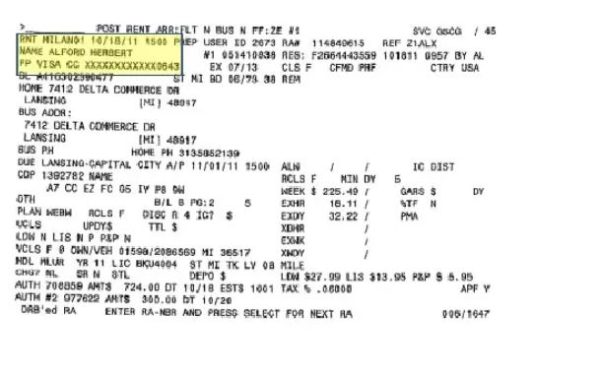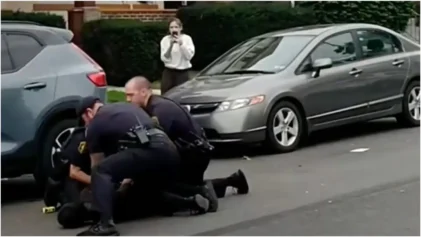A Black man spent five years behind bars for a murder he insists he didn’t commit.
His whole time behind bars, he knew there was a key piece of evidence that proved he was innocent.
But Herbert Alford couldn’t get his hands on a receipt that showed he was renting a car at a Lansing, Michigan, airport when 23-year-old Michael Adams was shot dead in October 2011.
That’s because the company from which he rented the vehicle lost the receipt. Hertz failed to produce his proof of rental for more than three years. Now Alford, 47, is suing the rental company, alleging Hertz’s negligence and inaction cost him a murder conviction and five years of his freedom, The New York Times reported.
“We can’t put a dollar amount on years of your life and your reputation,” Alford’s attorney, Jamie White, told the newspaper.

Alford filed his civil lawsuit March 9 in a Ingram County, Michigan circuit court seeking unspecified monetary damages for the company’s failure to honor subpoenas in his murder case.
The Detroit man was released from prison last year after a judge granted his motion for a new trial. The judge’s order was based on the new evidence of the Hertz receipt.
“Almost five years of my life is gone from either sitting in jail waiting for trial or sitting in prison after the first trial,” Alford said in a December 2020 statement, according to the Lansing State Journal.
Police arrested Alford three days after Adams was shot execution-style during an Oct. 18, 2011 drug dispute over 50 pounds of stolen marijuana, according to the Lansing State Journal. Alford maintained his innocence, claiming he was renting a vehicle at Hertz’s Capital Region International Airport location at the time of the shooting. The Lansing airport is about eight miles from the scene of Adams’ shooting. The two sites were separated by a car ride of about 20 minutes.
The receipt showed Alford used a Visa credit card to rent the vehicle just six minutes after Adams was gunned down in broad daylight outside a shopping plaza near Lansing’s Old Everette neighborhood, according to Alford’s lawsuit.
“It’s too far away,’’ White said. “There is no way he could have committed this crime.”

But during his murder trial, Alford’s legal team was unable to acquire the rental receipt, which could verify his alibi. It was the crux of his defense.
White said he submitted two subpoenas and three court orders to compel Hertz to produce the paper trail for three years. In a statement, Alford’s attorneys said Hertz ignored the subpoenas and failed to cooperate with the court orders.
A jury convicted Alford of second-degree murder and weapons charges in December 2016. He was sentenced to 30 years to 60 years in prison for Adams’ homicide.
“Without having the Hertz records, Mr. Alford was denied his ability to present a full and fair defense at trial as he did not have access to the Hertz records that proved his alibi defense and his innocence,” his attorneys argued in the lawsuit.
Hertz did not produce the receipt until 2018. Company officials said they were “deeply saddened” by Alford’s ordeal but claimed they did not produce the receipt because they couldn’t find it.
“While we were unable to find the historic rental record from 2011 when it was requested in 2015, we continued our good faith efforts to locate it,” Hertz spokeswoman Lauren Luster, said in a company statement. “With advances in data search in the years following, we were able to locate the rental record in 2018 and promptly provided it.”
Alford’s attorneys say the receipt exonerated Alford. He appealed his conviction in August 2018. The Court of Appeals responded by overturning the conviction and granting his motion for a new trial. Ingham County Circuit Court Judge Clinton Canady III ruled that the “verdict has resulted in a miscarriage of justice.
“(This new evidence) could have significantly aided (Alford) in refuting the prosecution’s contention that (Alford) was the man who chased and gunned down the victim,” Canady said.
Alford was released from Michigan Department of Corrections custody in November 2018, but his attorneys said he remained in jail after his release from prison until he was let out on bond on Feb. 19, 2020.
The second trial was scheduled to start Dec. 8, according to the Lansing State Journal. But prosecutors dismissed the charges, calling the evidence from Hertz a “substantial factor” and noting it wasn’t available when Alford was tried originally.
“We do not believe that we can prove Mr. Alford’s legal culpability by the ‘beyond a reasonable doubt’ standard,'” Ingham County Prosecuting Attorney Carol Siemon wrote in a December statement, the Journal reported. “We have an ethical burden not to present cases that we do not believe can be proven at trial, regardless of any ambiguity about what happened on October 18, 2011.”
Hertz is in the midst of a bankruptcy reorganization. Alford’s attorneys acknowledged that could slow progress on his civil lawsuit. But they pledged to fight for compensation in a statement.
“Our attorney is working tirelessly to hold Hertz accountable for its negligence and wrongdoings that ultimately lead to a false conviction,” the law firm indicated. “No amount of money could ever take back the 5 years Alford lost in prison, but financial compensation will significantly help our client get back up on his feet.


